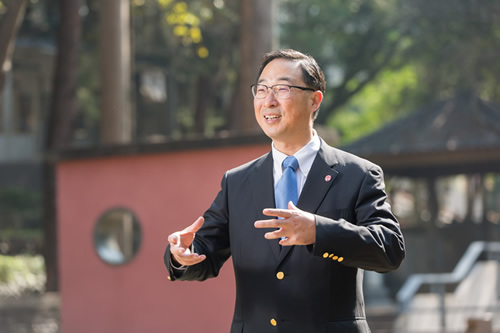Prof Wei Xiang-dong uses research and technology to improve life of underprivileged children
Prof Wei Xiang-dong
Professor, Department of Economics

After helping the 'left-behind children' in another project, I realised the main problem China faces is the unequal distribution of educational resources.
Prof Wei Xiang-dong
In terms of its economy, infrastructure and political influence on the international stage, China has seen unprecedented change in the past two decades. But that rapid pace of development has inevitably triggered a range of social issues.
Tackling the urban-rural gap in education
One of those is the issue of "left-behind children", whose parents have migrated from rural areas to join the urban workforce. Despite concerted government efforts to provide universal nine-year education in rural communities, these children typically face a lack of resources in schools compounded by limited family support at home. Not surprisingly, this often leads to unsatisfactory academic performance and limited prospects for advancement.
To tackle this problem, in particular the urban-rural gap in childhood education, Prof Wei Xiangdong, Dean of the Faculty of Social Sciences, has carried out a detailed research project. It involved a large-scale, but "randomised", experimental study in China to examine the effects of a series of policy interventions. These combined the use of an e-learning programme and different incentive schemes to motivate student learning. The results of the study are expected to have policy implications for many developing countries.
"After helping the 'left-behind children' in another project, I realised the main problem China faces is the unequal distribution of educational resources," Prof Wei says. By introducing a new set of e-learning resources for children in rural areas, the aim is to improve the quality of their education and reduce the gap between them and their urban counterparts. As a partner in the project, Prof Wei designed the e-learning module and assessed the effectiveness of different e-learning modes. Local education departments offered support and equipment, while Intel China provided experts to train teachers.
Successful pilot study
With a General Research Fund grant of HK$1.2 million in 2014, the first pilot study was launched in Nanchang, involving six primary and secondary schools with a total of 1,500-plus students and close to 80 teachers. The second stage followed in late 2015, involving 10 schools in the same province. One objective was to trial the "flipped class" mode of learning under which pupils study online at home before taking part in discussions and other activities in the classroom.
Usually, students were divided into small groups for these discussions or for teacher-led tutorials, based on their performance in a short online test conducted at the beginning of the lesson. This approach facilitated small-class teaching and encouraged individualised, self-directed learning. The initial results indicated that children using the e-learning mode showed a significant improvement in languages and mathematics. Their motivation and sense of satisfaction also increased.
Expanding the project
Prof Wei didn't stop there, though. Wanting to extend the benefits of the project, he took the basic model to Zhaoqing in late 2015. The local government there selected 31 schools, equipped them with the e-learning system, and helped to collect and assess results throughout 2016.
With the help from the local education bureau and funding support from his GRF grant, Prof Wei and his research team also experimented another low cost intervention in Shaoyang County, Hunan Province. Since 1994, the State Council of China has listed the county as one of the targeted areas for the state-level anti-poverty project. The project encourages teachers to give students and their parents regular feedback on student academic and behavioral performance at school. The first stage of the project covers over 2000 students in 10 schools. After one year's initial trial, it showed significant improvement on student educational outcomes, especially for those left-behind children.
Looking ahead, Prof Wei hopes to expand the e-learning project to other parts of China and even to other countries.